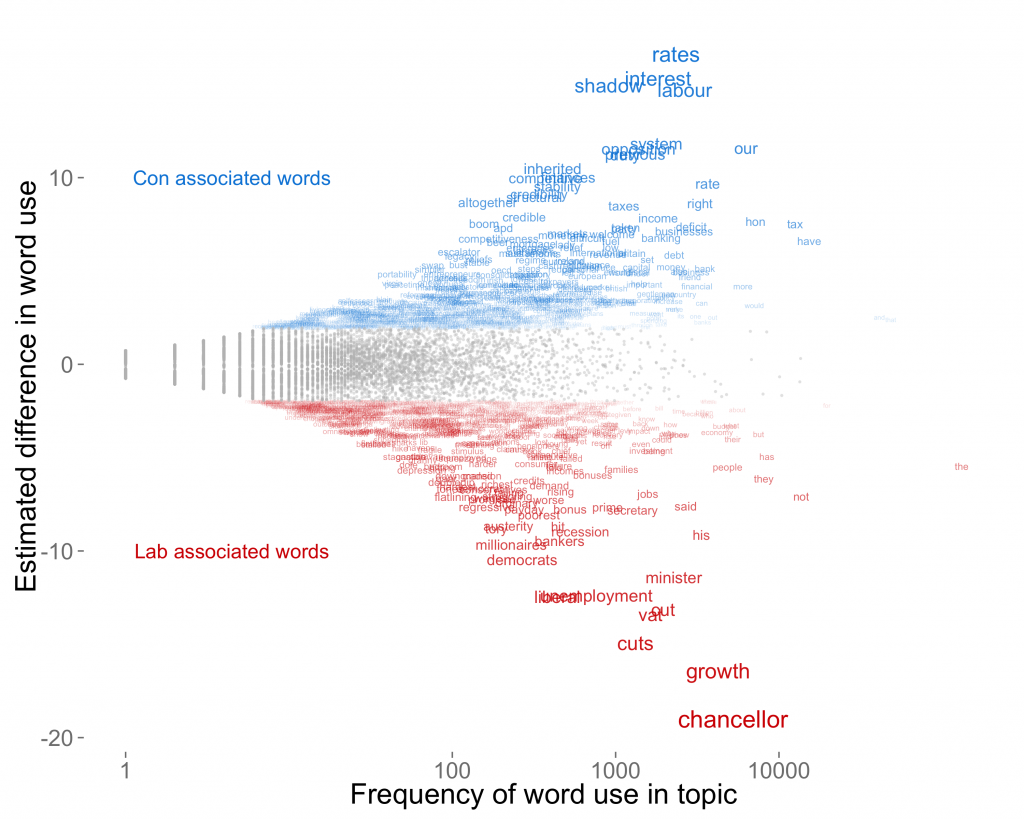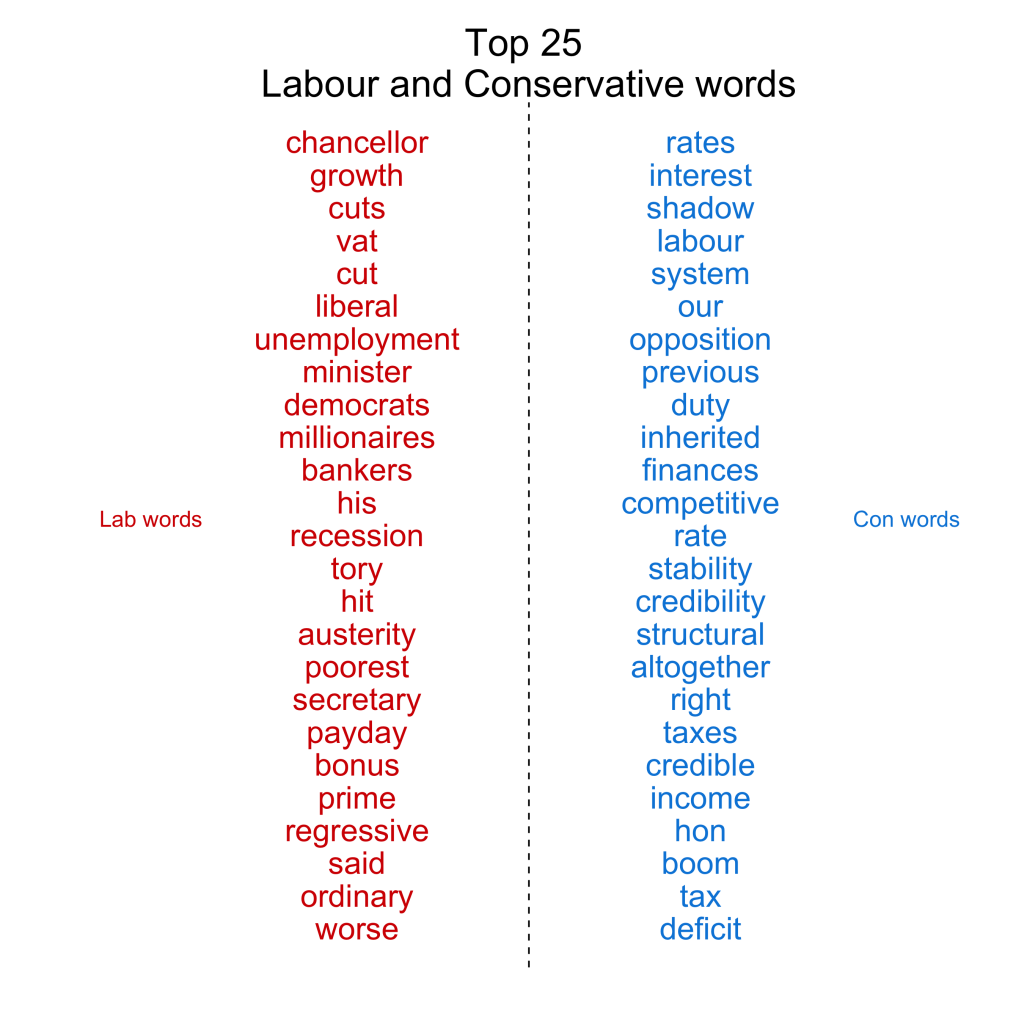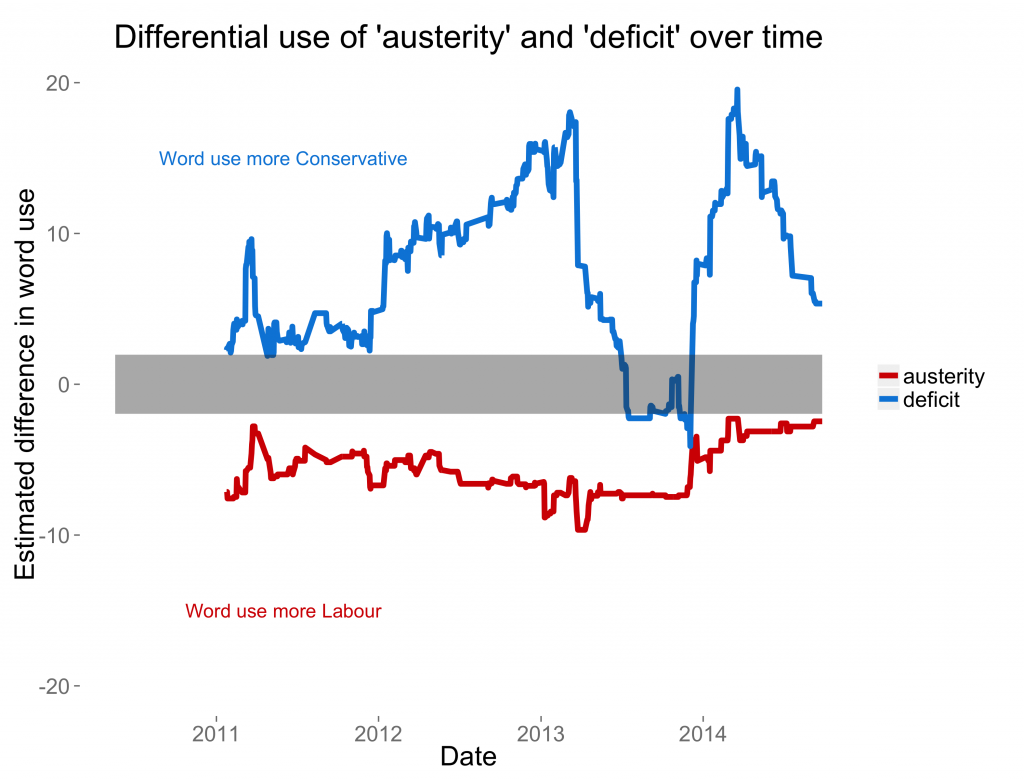 Ed Miliband delivered a speech this week in which he promised to cut the deficit if Labour wins the election in May. For many, this served as a reminder of the “deficit attention disorder” of the Labour leader, who ‘forgot’ to mention the deficit during his party conference speech in October. In this post, Jack Blumenau shows that, until now, avoiding talk of the deficit has been a systematic feature of Labour’s contribution to the political debate about the economy over the past four years. In a statistical analysis of parliamentary speeches, he shows that Conservative MPs are considerably more likely than Labour MPs to emphasise the deficit when debating economic issues. By contrast, Labour pays more attention to unemployment, austerity, and government cuts. One interpretation of these results is that Labour MPs strategically emphasise the issues on which the party holds a comparative advantage, and avoid issues which favour the Conservative party. Put in this context, Miliband’s recent speech marks a significant change in Labour’s long-term strategy, and suggests that Labour are willing to fight the election on issues that have previously tended to favour the Conservatives.
Ed Miliband delivered a speech this week in which he promised to cut the deficit if Labour wins the election in May. For many, this served as a reminder of the “deficit attention disorder” of the Labour leader, who ‘forgot’ to mention the deficit during his party conference speech in October. In this post, Jack Blumenau shows that, until now, avoiding talk of the deficit has been a systematic feature of Labour’s contribution to the political debate about the economy over the past four years. In a statistical analysis of parliamentary speeches, he shows that Conservative MPs are considerably more likely than Labour MPs to emphasise the deficit when debating economic issues. By contrast, Labour pays more attention to unemployment, austerity, and government cuts. One interpretation of these results is that Labour MPs strategically emphasise the issues on which the party holds a comparative advantage, and avoid issues which favour the Conservative party. Put in this context, Miliband’s recent speech marks a significant change in Labour’s long-term strategy, and suggests that Labour are willing to fight the election on issues that have previously tended to favour the Conservatives.
Which issues do politicians choose to emphasise when debating the economy? How do different actors emphasise different issues when discussing the same topic? One approach would be to select some words that we think are relevant to the topic at hand, and which might reveal partisan differences, and measure the frequency of their use between the two parties. For example, we could count the number of times that the two party leaders – Ed Miliband and David Cameron – use the word ‘deficit’ in their parliamentary speeches. By looking at all speeches made by the two leaders in the House of Commons between June 2010 and September 2014, this simple counting exercise reveals that the Conservative leader mentioned the deficit 520 times while the Labour leader mentioned it only 33 times. Although the raw difference is interesting, this simple counting method has a number of problems.
First, in any reasonably sized collection of texts, the number of unique words used will comfortably be in the thousands. For example, I use a corpus (a collection of texts) of all parliamentary speeches made by Labour and Conservative MPs since the last election: about a quarter of a million texts and over 15,000 unique words. Which of these thousands of words should we choose to analyse? Although we may be able to manually select an interesting subset, doing so might lead us to miss some of the most salient lexical differences between the two parties. It seems unlikely that we will always be able to guess, a priori, which are the best words to analyse.
Second, when confronted with such an avalanche of words (there are about one hundred and fifty million words in the corpus analysed here) it is difficult to know whether the simple differences in word use noted above are meaningful in either a statistical or substantive sense. For example, it might be that the raw counts for “deficit” presented above are simply due to the fact that the Cameron speaks more than Miliband.
Third, differences in word use might arise if the two parties devote different amounts of attention to different topics debated in parliament. Whilst this may also be of use in understanding political debate, it is not our direct interest here. Rather, our true interest lies in establishing whether Labour and the Conservatives adopt distinct rhetorical positions whilst discussing the same general topic.
Fortunately, we can use a variety of statistical tools to attempt to overcome these problems. First, in order to ensure that we are comparing word use between Labour and the Conservatives only on ‘economic’ speeches, I use a statistical technique (the details of which are here) to separate speeches into coherent policy areas. I then focus only on those speeches that relate to the economy.
Next, rather than arbitrarily picking a list of words to analyse, I use a second technique which allows us to make inferences directly from the texts themselves as to which words best distinguish Labour speeches from Conservative ones. The basic intuition behind this method is simple: differences between Labour and the Conservatives in the use of any particular word must be very pronounced before we are confident that we’re capturing something systematic about the way the two parties talk about the economy. The statistical model I use explicitly acknowledges that there is some degree of randomness in the way that politicians use words, and accounts for this when calculating differences between parties. The model estimates word-level partisan differences by calculating the log odds ratio of the use of each word by Labour and Tory MPs in speeches about the economy, down-weights this estimate by the variance of the word, and then further shrinks the estimate according to the frequency of the word in speeches about other issues. This may sound like Greek, but it is the intuition that is important. The actual Greek on which the model is based can be found here.
Figure 1 shows the results of this model applied to every unique word in the corpus. The plot shows, on the x-axis, how many times the word occurs in speeches on the economy. The y-axis indicates the degree to which a particular word is associated with the Conservative party (positive values) or the Labour party (negative values). Grey points in the centre of the y-range represent words which are not significantly associated with either Labour or the Conservatives. It is clear that Labour and Conservative MPs make speeches about the economy in ways that we would expect. For example, Conservative MPs are much more likely to mention ‘interest’, ‘rates’, and ‘taxes’, while Labour are more likely to use words such as ‘unemployment’, ‘growth’, and ‘cuts’. Furthermore, it seems that both parties talk about each other: words such as ‘Chancellor’, and ‘minister’ are associated with Labour, while ‘Labour’ and ‘Shadow’ are used more often by the Conservatives. Noticeably, both ‘debt’ and ‘deficit’ are strongly associated with the Conservative party – indicating that Labour speaks about this aspect of the economic debate systematically less than the Conservatives.
To make things a little clearer, the second figure shows the highest scoring words for each party identified by the model. As with figure one, it is clear that Labour and Conservative MPs use systematically different sets of words even when discussing the same topic. Interestingly, the Conservatives appear to use words that relate to the historical legacy of the economic turmoil that has marked the current parliament. In addition to their use of words that relate to the deficit, they also appear to use distinctive words that attribute blame to their predecessors: ‘inherited’, ‘Labour’, and ‘boom’ all are indicative of a strategy of blaming the opposition for past economic failures. Labour, by contrast, clearly emphasise elements of the economic debate that draw attention to the hardships imposed by current economic policies: ‘cuts’, ‘unemployment’, ‘hit’, ‘poorest’, and ‘austerity’ are all indicative of a general rhetorical approach that casts doubt on the efficacy and fairness of existing policy.
One possibility is that Labour has ceded ground on the deficit only recently and that Miliband’s conference omission reflected a change of course in Labour’s rhetorical strategy. To investigate this idea, I implement a version of the analysis above which takes into account how differential word usage between Labour and the Conservatives has changed over time. Figure 3 presents the results. As is clear, throughout almost all of the previous four years, the term ‘deficit’ is associated consistently and significantly with the Conservative party. Only for a brief period in 2013 does the word lose a strong Conservative association, and it quickly returns to be a word ‘owned’ by the Conservatives in 2014. Conversely, the word ‘austerity’ has been consistently associated with Labour MPs throughout the course of the current parliament. Although not depicted in this plot, the same can be said for ‘unemployment’, ‘cuts’ and ‘poorest’ on the Labour side, and ‘stability’, ‘credibility’, and ‘competitive’ for the Conservatives. It seems that the surprise expressed by many observers at Miliband’s conference omission was misplaced: in recent years, when discussing the economy in parliament, the Labour Party has systematically and consistently put less emphasis on the deficit than has the Conservative party. Accordingly, if this week’s speech is reflected in the more general pattern of speech from Labour politicians discussing the economy, then it marks a dramatic turn in Labour strategy.
The obvious question is, why does this happen? Why have Labour MPs avoided talking about the deficit while stressing other aspects of the economic debate? One answer could be that such rhetoric reflects traditional Labour and Conservative ideological stances. Historically, the Conservatives have been concerned with shrinking the size of the state and with espousing fiscal prudence, while Labour has tended to promote a more generous welfare state, prioritised keeping unemployment low and argued for more government involvement in the economy.
However, an alternative view is that parties engage in strategic issue ownership: they avoid emphasising issues on which voters view the opposition as more capable, and pay more attention to the issues on which they hold the comparative advantage. Rigorous testing of this hypothesis is beyond the scope of this post but some tentative supporting evidence can be seen in the British Election Survey in which 62% of respondents attribute responsibility for the size of the national debt to Labour, and only 29% blame the Conservatives. By contrast, 60% of respondents blame the Conservatives for rising living costs, with only 23% blaming Labour. Consequently, voters appear to view the Conservatives as the more capable when it comes to dealing with the deficit, but favour Labour when it comes to other aspects of the economy. Accordingly, it is rational for Labour to downplay the deficit — a Conservative ‘owned’ issue — and pay more attention to other economic issues instead. If this intuition is correct, then this week’s speech was a bold move, as it signals that Labour will compete the election on economic ground that tends to favour the Conservatives.
Of course, we don’t know from this analysis whether MPs speak strategically in order to exploit the comparative advantages they have over opponents, or whether such reputational advantages are driven by the attention that MPs pay to issues in their public utterances. Ed Miliband will hope that it is the latter, and that this week’s intervention will improve Labour’s reputation as economic managers. Regardless of whether Miliband truly ‘forgot’ to mention the deficit at the party conference, such an omission was in-keeping with the general tendency of Labour MPs to downplay the deficit in their parliamentary speeches. His speech this week breaks with this general pattern, and suggests that the battle over the economy in the next five months may be fought over different lines than the battle of the past five years.
Note: This article was originally published on our sister site, the LSE’s British Politics and Policy blog, and gives the views of the author, and not the position of the British Politics and Policy blog, nor of the London School of Economics. Please read our comments policy before posting. Featured image credit:
 Jack Blumenau is a PhD candidate at the London School of Economics.
Jack Blumenau is a PhD candidate at the London School of Economics.









1 Comments